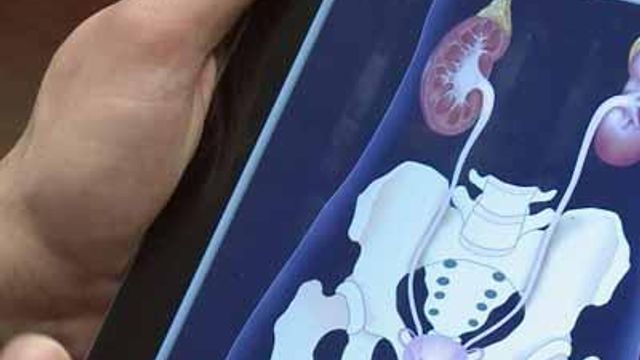Painful kidney stones often caused by diet
Few physical problems are as painful as kidney stones. In fact, many women who've had them say the pain is worse than natural child birth. WRAL's Dr. Allen Mask explains what causes them and how to avoid them.
Posted — UpdatedLast February, Marie Watson had friends over at her house when she began feeling terrible.
“I got abdominal pain and back pain, really severe,” she recalled.
The pain was so bad that she went to Duke Raleigh Hospital's emergency department, where a CT scan revealed the problem: a kidney stone.
“It was blocking the kidney, which is why it causes pain,” said Dr. Michael Lipkin, urologist at Duke Raleigh Hospital.
He said Watson's stone was only a centimeter in size, but its long shape made it less likely to pass on its own.
“So, they had to go in and do a laser surgery and put a stent in,” Watson said.
Dehydration, obesity, a diet high in salt and not enough calcium are among several factors that increase the possibility of kidney stones. It can even be due to a genetic predisposition. The answer is in your urine.
The answer for Watson? Genetics.
“Family history increases your risk of forming a stone about three-fold,” Lipkin said.
He Lipkin says there are several medications that may be added to changes in diet to prevent stones. Watson is on a medication, and she drinks more fluids.
“Lemonade,” she said. “Drinking a lot of lemonade.”
Lemons “have something called ‘citrate’ in them, which actually inhibits stone formation,” Lipkin said.
It's working for Watson, and she's passing the news on to the rest of her family.
“I told them you need to go find out how you can keep from having them,” she said.
Most kidney stones are made up of oxalate, a substance found in healthy green vegetables, tea, chocolate, strawberries and blueberries. Those foods can still be eaten, but make sure to drink about three liters of fluid a day and have three servings of foods rich in calcium.
• Credits
Copyright 2024 by Capitol Broadcasting Company. All rights reserved. This material may not be published, broadcast, rewritten or redistributed.






